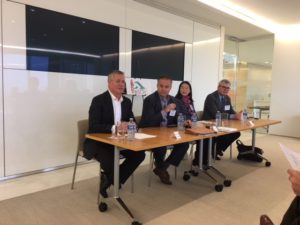
US-China Briefing: Trade and Investment Policies in the Digital Ecosystem

Washington State China Relations Council

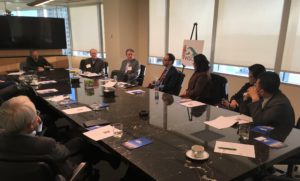
On October 26, 2017, the Washington State China Relations Council assembled the ninth session of the policy briefing series at Davis Wright Tremaine Law Firm in Seattle. James Green, the Minister Counselor for Trade Affairs to the Office of the United States Trade Representative (USTR) at the U.S. Embassy in China and advisor to the Ambassador on trade policy, discussed “US-China Trade Relations: View from Beijing.”
Through the course of over two decades of work in China, James Green has advised five ambassadors on trade policy and counseled numerous trade representatives, including current USTR Robert Lighthizer, who has identified China Relations as a key focus during his time in office.
The decade-long conversation regarding terms of the Bilateral Investment Treaty (BIT) between US and China was a major point of discussion. BIT negotiations gained momentum around 2013 but recently have been lying low in consideration of more pressing matters. Ratification of a treaty is an ambitious goal, Mr. Green pointed out, as treaties require a two-thirds senate majority to pass. He emphasized that timing and the provision of adequate context are key when discussing the Treaty with members of Congress. Mr. Green opines that it is in the Treaty’s best interest that it be temporarily sidelined, as it is preferable that dialogue continue at a deliberate pace than that the Treaty be written off hastily in this time of uncertainty.
Mr. Green shared insights on difficult policy questions such as China’s “negative list” in trade agreement negotiations, technology transfer, and access to the finance and banking industries. His insider view from being on the ground in Beijing provided a unique perspective on these issues, particularly in light of authority shifts following the 19th National Party Congress.
Mr. Green’s expert knowledge on a variety of topics involving current US-China Relations sparked a dynamic Q&A session following the presentation.
Special thanks to Davis Wright Tremaine for hosting James Green and the WSCRC for this session of the Policy Briefing Series.
Summary author: Trudy Boothman
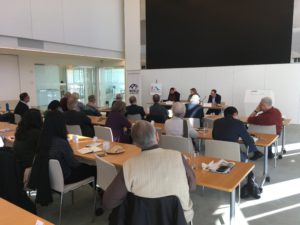
On October 27, 2017, WSCRC partnered with the World Affairs Council for a panel discussion at K&L Gates Law Firm in Seattle. Mercy Kuo, WSCRC President, and James Green, Minister Counselor to the United States Trade Representative and trade policy advisor to the U.S. Ambassador in Beijing, engaged in a lively discussion moderated by Jackie Miller, president of the WAC.
Dr. Kuo and Mr. Green outlined their respective views on areas of progress and uncertainty in current US-China relations, providing all in attendance with a better-informed sense of where relations stand and where they are heading.
Mr. Green discussed interactions between China’s state-capitalist model and WTO market expectations, and identified sectors of the US economy which are most likely to become embroiled in controversy over the definition of “unfair trade practices.” He continued by addressing the pros and cons of the Trump administration’s plan to favor bilateral trade negotiations over multilateral agreements. He advised that the US examine its historic commitment to free trade and to rally its market allies to ensure the advancement of fair and sustainable trade models.
Dr. Kuo unpacked motives behind China’s ambitious Belt and Road Initiative, linking it to the Party’s priorities coming out of the 19th National Party Congress. In a semantic analysis of 19th versus 18th National Party Congress speeches, Dr. Kuo found that mentions of “state,” “military,” and “party” increased, while mentions of “reform” decreased. In terms of rhetoric, these items are likely to be prioritized in the new era of Chinese hegemony which President Xi plans to usher in. Moreover, she explained implementation of BRI projects will reflect China’s objective to play a more prominent leadership role in the region.
Following the panel conversation, the audience guided the discussion with a host of thought-provoking questions regarding one of the world’s most prominent bilateral relationships.
Special thanks to the World Affairs Council for co-hosting this event, and to K&L Gates for providing the venue.
Summary author: Trudy Boothman
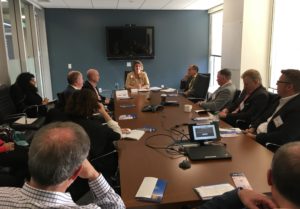
On October 16, 2017, WSCRC joined the AJC Asia Pacific Institute to welcome Dr. Samantha Ravich to an invitation-only discussion on cybersecurity at WSCRC in Seattle. Dr. Ravich, Principal Investigator for the Project on Cyber-Enabled Economic Warfare and former Deputy National Security Advisor in the Office of Vice President Cheney, shared her perspectives on growing security challenges of cyber-enabled economic warfare.
Based on extensive knowledge and experience in the field, Dr. Ravich elucidated the multi-dimensional nature of the motives behind cyber-attacks and the relationship between the US economic and military strength. Dr. Ravich detailed how cyber-attacks pose an imminent danger to critical US industries including banking, infrastructure, intellectual property, and intelligence, which underpin the economy and fund US powerful military.
While the US and China are often seen as being at odds in the terms of cybersecurity, Dr. Ravich pointed out that in fact it is in the best interest of both parties to work together on this front, especially in consideration of the interdependence of the two economies. Additionally, Dr. Ravich discussed the potential role that Israel, a global leader in cybersecurity, could play as the third corner of the US-China-Israel triangle, in leading the conversation on cybersecurity and attacks and defining global security norms.
Special thanks to the AJC for co-organizing with WSCRC and to Dr. Samantha Ravich for participating in this informative, invite-only briefing.
Summary author: Trudy Boothman
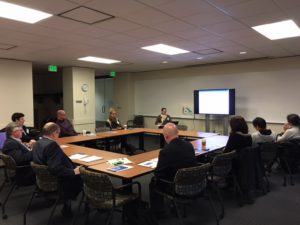
Washington State China Relations Council
1301 5th Avenue, Suite 1500 Seattle, WA 98101-2611
Tel: (206) 441 - 4419
E-mail: info@wscrc.org